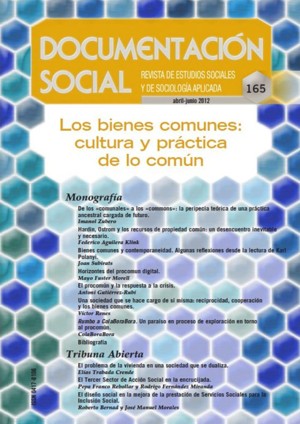
Corporate Documentation No. 165
JOURNAL OF SOCIAL STUDIES AND APPLIED SOCIOLOGY
The commons: the culture and practice of the common
Imanol Zubero (coordination)
“A spectre is haunting the world: the phantom of the comonismo” (yes, with “or”). Surely, we exaggerate, but well may these words be the beginning of a new Manifesto that try to find (and return) a shared sense of the proliferation of protests and social struggles that, from its inception, it has become one of the most unique features of this TWENTY-first century.
It all started on the 30th of November 1999 in Seattle, when thousands of people demonstrated against the summit of the World Trade Organization (WTO), with the cry of “Whose streets? Our streets! Whose world? Our world!” (Who is the street? Our! Who is the world? It’s our business!). With the antecedent of the First Intercontinental Encounter for Humanity and Against Neoliberalism, organized in 1996 in Chiapas by the Zapatista Army of National Liberation (EZLN), the “battle of Seattle” was the crack unexpected for the that leaked the criticism and the response to the neoliberal system of global. Response since then has not ceased to be felt throughout the present century, from the constitution of the World Social Forum started in Porto Alegre in 2001 until the spring of 2011, with a wave of indignation by occupying the squares around the world.
But, really, how there’s something –something at once objective and meaningful– which allows us to link so many and so various manifestations of resistance that have arisen in places as different and as distant, raised scales –global, local most– so different? Other modes of co-producing, co-decide and, above all, other modes of co(n)live, which are neither public nor private, without having to be antiestatales or antimercantiles.
Seems to us like a reflection at all is foreign to the themes and concerns that have often been addressed by this journal throughout their career; on the contrary, the question of the commons can serve to strengthen our reflection on such matters as the nature of the so-called third sector, the possibilities of the social and solidarity economy, identity, and the logic characteristic of voluntary action, etc, For this reason, in this number of corporate Documentation, we wanted to probe this question of the common goods, the commons or the commons, denominations, all of them used to refer to a traditional practice widely spread all over the globe, renewed and reinforced in the last years of the hand of the anti-globalisation movement and its struggle against the commodification of the world and the collective claim to knowledge and culture-free. The granting in 2009 of the Nobel Prize in Economics to political science american Elinor Ostrom has once again put this issue on the agenda in the theoretical and in the public debate. This is an excellent opportunity to reflect on a perspective and a practice that invites us to recover, since new keys, the project of a common life.
.
Index
Presentation. Imanol Zubero
Monograph
- Of the commons” to “commons”: the story of a theoretical approach to an ancient practice full of future. Imanol Zubero
- Hardin, Ostrom and common property resources: a clash inevitable and necessary. Federico Aguilera Klink
- Common goods and contemporaneity. Some reflections on the reading of Karl Polanyi. Joan Subirats
- Horizons of the digital commons. Mayo Fuster Morell
- The commons and the response to the crisis. Antoni Gutiérrez-Rubí
- A society that takes care of itself: reciprocity, cooperation and common goods. Victor Renes
- Heading to ColaBoraBora. A paradise in the process of exploration around the commons. ColaBoraBora
- Bibliography
Open Platform
- The problem of housing in a society that is dualiza. Elijah Locked Crende
- The Third Sector of Social Action at the crossroads. Pepa Franco Rebollar and Rodrigo Fernández Miranda
- Social design in the improvement of the provision of Social Services for Social Inclusion. Roberto Bernard and José Manuel Morales
Documentation
- Three documents about the common good.
Book reviews
- Roma population in spain and eastern Europe: Employment and social inclusion 2011. A comparative study. Fundación Secretariado Gitano.Laura Andres
- Social intervention, neighborhood and community social services. Germán Jaraíz Arroyo. Guadalupe Cordero Martín
- How to end hunger in times of crisis. Ignacio Trueba and Andrew MacMillan. Patricia Pavón Fernández
.
Fragment (p. 1-11)
Buy this Monograph
For more information: [email protected]
.
